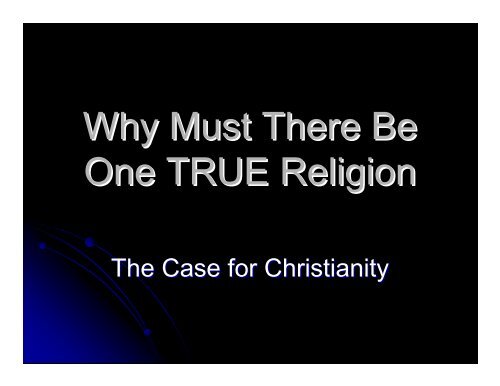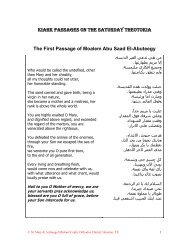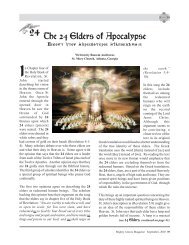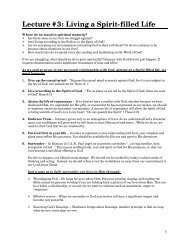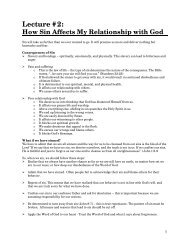Why Must There Be One TRUE Religion
Why Must There Be One TRUE Religion
Why Must There Be One TRUE Religion
You also want an ePaper? Increase the reach of your titles
YUMPU automatically turns print PDFs into web optimized ePapers that Google loves.
<strong>Why</strong> <strong>Must</strong> <strong>There</strong> <strong>Be</strong><br />
<strong>One</strong> <strong>TRUE</strong> <strong>Religion</strong><br />
The Case for Christianity
Introduction<br />
• <strong>Why</strong> do I not accept the popular idea that<br />
one religion or philosophical worldview is<br />
just as good as another?
The Exclusiveness of Truth<br />
• The law of non-contradiction<br />
• The law of non-contradiction is the foundation for all<br />
logical thinking it states that "A cannot be non-A A in the<br />
same time and in the same way."<br />
• For example: It cannot be both raining and not raining<br />
at the same time and in the same respect. From this<br />
we can infer that all truth, by definition, is exclusive<br />
• If Jesus Christ is the "only begotten Son" of God, then<br />
that honor cannot belong to anyone else.<br />
• If the Truth acknowledges one being as supreme lord,<br />
then it will reject all other contenders for the throne.
Do All <strong>Religion</strong>s Lead to the Same God?<br />
• Let us examine the differences between Buddhism, Islam, , and<br />
Christianity, , with regard to their teaching concerning salvation.<br />
• In Buddhism, salvation is through the elimination of all desire<br />
• In Islam, salvation is when our good deeds outnumber the bad.<br />
• In Christianity, salvation is a gift from God to humanity that is only<br />
attained by sound, loving and enduring faith in His Only <strong>Be</strong>gotten<br />
Son, Jesus Christ.<br />
• It is more reasonable to state that all religions are false than to say<br />
that more than one religion is true. So it follows that either<br />
• A) All of the major world religions are false, or<br />
• B) Only one religion is true.
What About Christianity<br />
• Contrary to popular belief, Christianity at its core is<br />
NOT only a religion… (form of rules and rituals with<br />
the thought of pleasing god and earning his favor).<br />
• Christianity is a way of life, a relationship to<br />
nourish.<br />
• The key to understanding Christianity is in<br />
understanding its author, the Lord Jesus Christ.<br />
• Christianity stands unparalleled among the world's<br />
spiritual belief systems because its author is also<br />
unparalleled
The Uniqueness of Christianity<br />
• Unlike Buddha, Mohammad, and others, Christ is<br />
alive today.<br />
• Christians are capable of being united with He<br />
who died and rose for them. This relationship is<br />
not found in any other religion.<br />
• The Author of our faith claims to be God incarnate,<br />
a claim that was never made by any other<br />
religious leader.
The Uniqueness of Christianity<br />
• God is perfect. Human <strong>Be</strong>ings are imperfect.<br />
• As a result mankind can only create imperfect religions.<br />
• All man-created religions are imperfect and have<br />
common characteristics.<br />
• This makes the one religion created by God unique,<br />
because it has characteristics only God could give it.<br />
• In no other religion does the leader of that religion<br />
die so that his followers may live.<br />
• Christianity is the only religion in which love,<br />
including love of enemies, is the central theme.
The Case for Christianity<br />
1. The Reality of the Existence of Christ<br />
• A large portion of the Bible is made of eyewitness<br />
accounts of people who were actually there.<br />
• Christians do not depend on a single individual's<br />
revelation of the truth (as, for example, in Islam and<br />
Buddhism).<br />
• That which was from the beginning, which we have<br />
heard, which we have seen with our eyes, which we<br />
have looked upon, and our hands have handled,<br />
concerning the Word of life--<br />
(1 John 1:1)
The Case for Christianity<br />
1. The Reality of the Existence of Christ (con’t)<br />
• The Jewish historian Flavius Josephus, who was not<br />
a Christian, wrote in 93-94 94 A.D.: "At this time there<br />
was a wise man who was called Jesus. And his<br />
conduct was good, and [he] was known to be<br />
virtuous. And many people from among the Jews and<br />
other nations became his disciples. Pilate<br />
condemned him to be crucified and to die. And those<br />
who had become his disciples did not abandon his<br />
discipleship. They reported that he had appeared to<br />
them three days after his crucifixion and that he was<br />
alive; accordingly, he was perhaps the messiah<br />
concerning whom the prophets have recounted<br />
wonders." Antiquities of the Jews, XVIII.iii.3
The Case for Christianity<br />
2. The Divinity of Jesus Christ<br />
• Christ’s s authority over the law, creation, sin, and death.<br />
• Christ’s s sinlessness. No one could make this claim.<br />
• Christ’s s countless miracles.<br />
• Miracles are a powerful confirmation because it<br />
authenticates the creator's authority over His<br />
creation.<br />
• Christ and the fulfillment of prophecies.<br />
• The prophecies included the city of birth, His<br />
method of dying, His betrayal, His resurrection, etc.
The Case for Christianity<br />
3. The Resurrection of Christ<br />
• The resurrection of Jesus Christ is the cornerstone<br />
of the Christian faith. But did He rise from the<br />
dead?“<br />
• For the apostles, what was there to gain from<br />
preaching that Christ was risen from the dead if He<br />
really had not risen ?<br />
• If they did not believe in the resurrection, they would<br />
have known that what they were preaching was a<br />
lie. Do you know anyone who would knowingly die<br />
for a lie?<br />
• <strong>There</strong> was no financial gain; there was no social<br />
prestige; there was no political power to come as a<br />
result of their preaching the resurrection.
The Case for Christianity<br />
3. The Resurrection of Christ (con’t)<br />
As an atheist, lawyer and journalist Lee Strobel did a two-<br />
year investigation on the resurrection interviewing some of<br />
the great scholars on both sides. He finally concluded in his<br />
book The Case for Christ,<br />
“In light of the convincing facts I had learned during my<br />
investigation, in the face of this overwhelming avalanche<br />
of evidence in the case for Christ, the great irony was<br />
this, it would require much more faith for me to maintain<br />
my atheism that to trust in Jesus of Nazareth.”
The Case for Christianity<br />
4. The Authenticity of the Holy Bible<br />
• The Holy Bible proves to be true historically and<br />
scientifically<br />
• The Bible answers the major questions all belief<br />
systems must answer.<br />
• Where did we come from?<br />
• What is the nature of the divine?<br />
• What is the nature of man?<br />
• What is the answer to the human predicament?<br />
• What happens after death?<br />
• How do we explain evil?
The Case for Christianity<br />
5. The Duality of the World.<br />
• On one hand, nature is beautiful and majestic. At the<br />
same time, we are confronted with storms,<br />
earthquakes, drought and epidemics.<br />
• Fame does not endure. Riches slip away between our<br />
fingers. Brief moments of happiness are followed by<br />
long periods of emptiness and aimlessness.<br />
• Dreams do not come true. A few minutes of joy are<br />
succeeded feelings of discontent. Youth is replaced<br />
by old age. Death is always waiting for people of<br />
every age.
The Case for Christianity<br />
5. The Duality of the World.<br />
• Questions in a dire need for an answer:<br />
• <strong>Why</strong> does the world seem to give with one<br />
hand, only to take away with the other?<br />
• More importantly, why is it that we cannot<br />
reconcile ourselves to this duality, but<br />
rather long for complete harmony and<br />
order?<br />
• It turns out that the greatest contradiction in<br />
this world lies within our very selves.
The Case for Christianity<br />
5. The Duality of the World.<br />
• <strong>There</strong> is some aspect of our nature which does not<br />
think and feel according to the laws of the physical<br />
world, but according to some other spiritual law.<br />
• This is why man can never be reconciled with the facts of<br />
destruction and death.<br />
• A clear and precise answer to this important question is<br />
provided by Christianity.<br />
• It affirms that there really does exist another and better<br />
world, called the kingdom of heaven.
Comparative <strong>Religion</strong><br />
Hinduism<br />
Most Hindus worship infinite representations of ultimate<br />
oneness (Brahman) through a multitude of gods and<br />
goddesses, over 300,000 of them. These various<br />
manifestations of gods and goddesses become incarnate<br />
within idols, temples, gurus, rivers, animals
Comparative <strong>Religion</strong><br />
Buddhism<br />
Buddhists do not worship any gods or God. People outside of<br />
Buddhism often think that Buddhists worship the Buddha. However,<br />
the Buddha (Siddhartha Gautama) never claimed to be divine, but<br />
rather he is viewed by Buddhists as having attained what they are<br />
also striving to attain, which is spiritual enlightenment and, with it,<br />
freedom from the continuous cycle of life and death.
Comparative <strong>Religion</strong><br />
NEW AGE<br />
New Age promotes the development of the person's own power or divinity.<br />
When referring to God, a follower of New Age is not talking about a<br />
transcendent, personal God who created the universe, but is referring to a<br />
higher consciousness within themselves. A person in New Age would see<br />
themselves as God, the cosmos, the universe. In fact, everything that the<br />
person sees, hears, feels or imagines is to be considered divine.
Comparative <strong>Religion</strong><br />
ISLAM<br />
Muslims believe there is the one almighty god, named Allah, who is<br />
infinitely superior to and transcendent from humankind. Allah is viewed as<br />
the creator of the universe and the source of all good and all evil.<br />
Everything that happens is Allah's will. He is a powerful and strict judge,<br />
who will be merciful toward followers depending on the sufficiency of their<br />
life's good works and religious devotion. A follower's relationship with Allah<br />
is as a servant to Allah.
Comparative <strong>Religion</strong><br />
CHRISTIANITY<br />
Christians believe in a loving God who has revealed Himself and can be<br />
personally known in this life. With Jesus Christ, the person's focus is not on<br />
dead religious rituals, but on enjoying a relationship with God and growing<br />
to know Him better. Faith in Jesus Christ Himself, not just in His<br />
teachings, is how the Christian experiences joy and a meaningful life.
Conclusion<br />
• Story of the cave man


